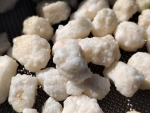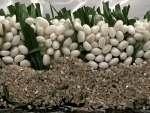Baden-Württemberg and its companies
Bioeconomy refers to the sustainable management of renewable natural resources, which is why there is no such thing as a bioeconomy industry in the traditional sense. However, there are companies in Baden-Württemberg that use biomass as raw material base and have already developed products and processes in their effort to act more sustainably
The energy producer badenova uses male corn plants to produce renewable natural gas (RNG). The company circumvents the food vs fuel conflict as the male plants are only used to pollinate female corn before being discarded. A company called TECNARO from Ilsfeld/Auenstein near Heilbronn has developed a technology that it uses to produce injection-mouldable plastics and fibrous materials from lignin. These materials are already being used in numerous products. The company fischerwerke has developed a wall plug that is partially produced from renewable resources. The wall plug is produced from two-component nylon, and one of the two components is produced from castor oil. Daimler AG's A-Class is equipped with an engine cover that is also produced with a plastic partially made from biological resources.
Companies not only face challenges relating to products, but also concerning innovative production processes. New methods and machines need to be developed in order to be able to use biomass sustainably on an industrial scale. This means that traditional sectors such as the mechanical engineering and plant construction sectors must be made aware and persuaded of the necessity and benefits of the bioeconomy.
Company profiles
-
Wasser 3.0: #detect|remove|reuse - 31/10/2023

We all pollute our water with things we use in our everyday lives. In the process, microplastics and micropollutants accumulate in sometimes significant quantities and are difficult to remove. This has increasingly devastating consequences for our health and the environment. Wasser 3.0, a non-profit start-up from Karlsruhe, has declared war on this problem by developing a customisable process to detect, remove and even recycle these pollutants.
-
Microorganisms degrade biobased turf infill - 17/10/2023

There are thousands of artificial turf pitches in Germany. They are extremely practical, but often not at all environmentally friendly. When it rains or the pitch is used, plastic particles from the rubber granules can be released into the envronment, where they remain. Researchers at the University of Stuttgart along with the company TECNARO are now developing an artificial turf with an infill that biodegrades as soon as it leaves the pitch.
Company foundations in the bioeconomy field
-
Wasser 3.0: #detect|remove|reuse - 31/10/2023

We all pollute our water with things we use in our everyday lives. In the process, microplastics and micropollutants accumulate in sometimes significant quantities and are difficult to remove. This has increasingly devastating consequences for our health and the environment. Wasser 3.0, a non-profit start-up from Karlsruhe, has declared war on this problem by developing a customisable process to detect, remove and even recycle these pollutants.
-
Microorganisms degrade biobased turf infill - 17/10/2023

There are thousands of artificial turf pitches in Germany. They are extremely practical, but often not at all environmentally friendly. When it rains or the pitch is used, plastic particles from the rubber granules can be released into the envronment, where they remain. Researchers at the University of Stuttgart along with the company TECNARO are now developing an artificial turf with an infill that biodegrades as soon as it leaves the pitch.
News of bioeconomic companies
-
Press release - 14/09/2023
The Cultivated B (TCB) began discussions with the European Food Safety Authority (EFSA) and officially entered the pre-submission process for novel food approval of a novel or non-farmed sausage product. Subsequent to the official submission, TCB will emerge as world’s first biotech company to apply for EFSA certification for cultivated meat. This is a pivotal first step in the evolution of the cultivated meat market.
-
Press release - 30/08/2023
Rising sea levels due to climate change and artificial irrigation cause soil salinity to increase. This has a negative impact on agriculture, including viticulture. The plants die, yields decrease. Researchers of Karlsruhe Institute of Technology (KIT) have therefore studied a wild grapevine of higher salt tolerance. Their goal is to identify the genetic factors that make the grapevine resilient.
Website address: https://www.biooekonomie-bw.de/en/bw/stakeholders/companies

